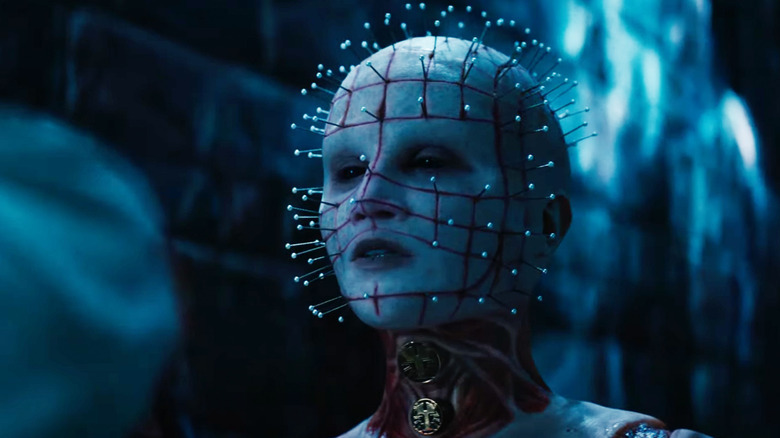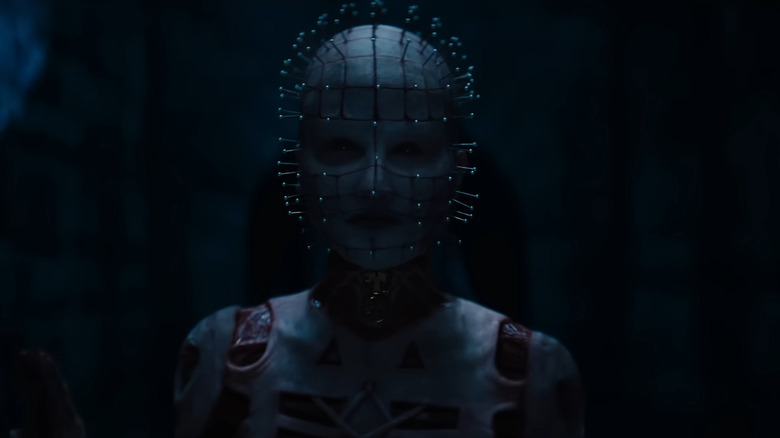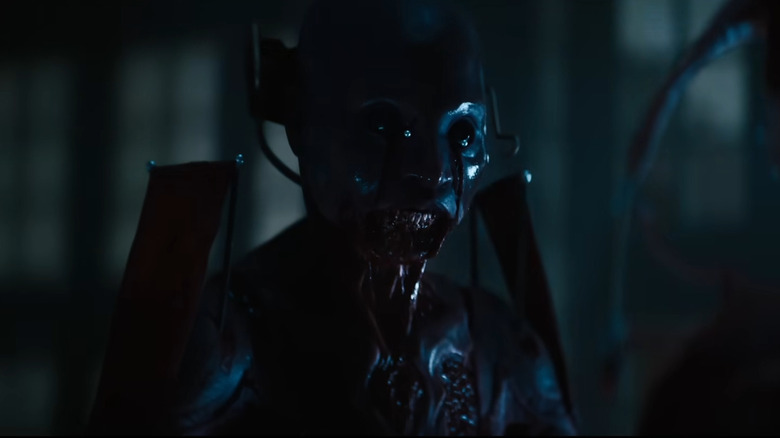David Bruckner Doesn't Want Fans Worrying About Canon While Watching Hulu's Hellraiser
Playing canonically fair with the "Hellraiser" film series is a tricky proposition. Although the first eight "Hellraiser" movies feature Doug Bradley as Pinhead, the franchise's central monster, few of them seem to interconnect in any kind of meaningful way. Clive Barker's original "Hellraiser" (1987) and Tony Randel's "Hellbound: Hellraiser II" (1988) feature many members of the same cast and follow the same continuity, but after that, the series becomes a little hazy. Anthony Hickox's "Hellraiser III: Hell On Earth" (1992) takes place in America and features a new protagonist and an altered version of Pinhead who now wants to cause mayhem on Earth (previously, Pinhead was an S&M lord who was content for people to come to him).
Kevin Yagher's "Hellraiser: Bloodline" (1996) was the series' last attempt to keep continuity clear, working the events of "Hellraiser III" into a broader "Hellraiser" myth. "Bloodline" covers both the invention of the Lemarchant Configuration and the death of Pinhead in the distant future.
"Hellraiser: Inferno" (2000), "Hellraiser: Hellseeker" (2002), and "Hellraiser: Deader" (2005) are all self-contained "Tales from the Crypt"-style morality plays that don't share any kind of timeline or continuity, despite the fact that Ashley Laurence — Kirsty from the 1987 original — returned for "Hellseeker." The mythology of "Hellraiser" was not expanded with these sequels. Curiously, "Hellraiser: Hellworld" (also 2005) takes place in a world where "Hellraiser" is a mere 1987 movie that the characters are fans of. "Hellraiser: Revelations" (2011) might function as a reboot of the original, and "Hellraiser: Judgment" (2018) is its own animal altogether. That one has angels in it.
It's no wonder, then, that David Brucker, director of the new "Hellraiser," due on Hulu on October 7, should remain unconcerned about continuity, a notion he forwarded in a recent interview with Gizmodo.
Hellraiser XI
Bruckner seems to have taken the "soft reboot" approach to his new "Hellraiser" film. It takes a lot of iconography and canonical details from throughout but remixes them into something that only resembles the original. This way, Bruckner could make a film that acknowledged the existence of the first ten movies without having to play by any specific chapter's rules. When asked if "Hellraiser" counts as a remake or merely the eleventh film in the series, Bruckner was vague but diplomatic. He used the catch-all word of "reimagining," and even suggested the film be called "Hellraiser 2022" to differentiate it from the others. In his words:
"['Hellraiser'] just sounded better than 'Hellraiser 11.' If it was up to me, we'd put the year on it when we discuss it, because I think we all kind of know where it situates. But it just didn't feel appropriate to put an additional title on it this time. As far as what fans can expect, it's a re-imagining, to one degree. I also think that it fits within the world of 'Hellraiser' and what you've seen before in many ways. I wouldn't say it's strict canon."
"Strict canon," as established, is very vague when dealing with "Hellraiser," and Bruckner clearly didn't want to pull a "Halloween" (2018) gambit where some sequels counted as canon and others didn't. It was perhaps wise to simply start from scratch, as it were. After all, few of the straight-to-video "Hellraiser" sequels have been too widely seen, and none of them are particularly beloved.
Letting the conversation grow
Bruckner previously directed the 2020 haunted house picture "The Night House" as well as the 2017 wilderness horror film "The Ritual," both which feature striking, interesting visuals. Bruckner is clearly a stylist more interested in bringing his own aesthetic into a film than he is recreating an old one. The first two "Hellraiser" films were made on a budget in the 1980s and feature practical effects and comparatively gritty photography. There are many shots in the early films of fishhooks puncturing a rubbery substance that's clearly meant to be human skin. Bruckner certainly wasn't going to recreate that. He would, as he explained, rather run with his own imagination. He even gets a little ecstatic about movies and their place in the world. In his words:
"[W]e let our imaginations run with this. I'm a big believer that, you know. Movies are dreams and sometimes they present strange iterations of one another, and that we should just embrace that and kind of run with it. My suggestion to fans is to go into it not thinking exactly where it's fitting in the history of the series and to just experience the film. And then, I don't know. We'll see what conversations grow from there."
In short, don't look for references to the skinless Frank or to Kirsty or even to the WWI-era Capt. Elliott Spenser, the human who was transformed into Pinhead. "Hellraiser" (2022) is an animal unto itself with a new vibe, a new puzzle, a new Pinhead. Although Bruckner seems to shrink from the phrase, it appears to be a proper remake.
Anyone who has seen the previous ten movies has likely, like this author, figured that to be in for a penny is to be in for a pound. Bring it on.


